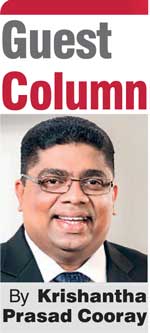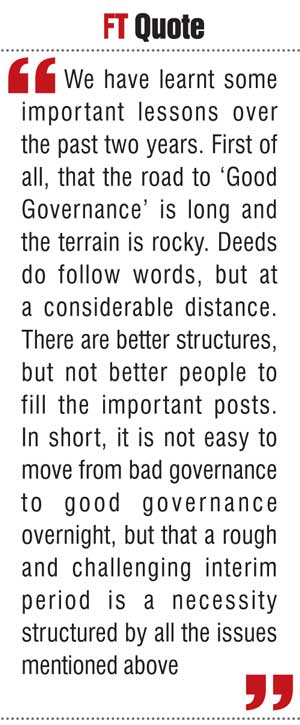Monday Feb 16, 2026
Monday Feb 16, 2026
Tuesday, 20 December 2016 00:10 - - {{hitsCtrl.values.hits}}
The only thing that will keep the coalition intact is work, good work that delivers, good work done by good people. The silver lining is that we have in the President and the Prime Minister the two men best equipped to get the job done
President Maithripala Sirisena was brought to power in January 2015 by a need for change. It was not just a change of government that was called for, but a change of governance. An end to the way things had been done, not just by the regime at that time, but by successive governments over several decades.
I remember the moment when it was confirmed that Maithripala Sirisena had won. I felt immense satisfaction for having been part of the effort that brought about the spectacular victory. But more than that, it was a sense of relief and hope. Things would be better because things would be different. Systems, not personalities. Rule of law instead of rule of discretion.
I told myself that a powerful few will no longer be able to impose their will on the people. Sri Lanka would move away from the dictatorial regime marked by corruption, the politics of patronage, nepotism and waste. Sri Lanka would turn a new leaf and ensure good governance where no one will be above the law, nepotism will give way to meritocracy. We were going to be living in a democratic country where there is rule of law, where rights are protected, and where the judiciary is independent.
There would be development that was sensible, the economy would be managed prudently and it would benefit the general citizenry and not a few individuals and cronies bent on bankrupting the country. No more wastage of public funds, no more kick-backs, no further bloating of the public service and no excessive borrowings.
All this sounds like the theme of a fairy tale Disney movie, but several important steps were indeed taken to ensure that the promised good governance would be delivered despite the cynicism. The passage of the crucial 19th Amendment to the Constitution curtailing the near dictatorial powers of the Executive President and the establishment of independent commissions to run the public service, the judiciary, the police and several other key institutions.
The hard work of organisations such as the one spearheaded by the late Ven. Maduluwawe Sobitha Thero, supported of course by current Speaker, Karu Jayasuriya, and the parties that backed the campaign to defeat Mahinda Rajapaksa, led by the current Prime Minister Ranil Wickremesinghe and the United National Party bore fruit. The sense of purpose and sacrifice shown by President Maithripala Sirisena was also crucial in getting this piece of legislation done.
More change needed
Today, almost two years since the change, it is clear that altering the rule book was necessary, but not sufficient to establish a “difference”. The full potential of independent commissions is yet to be realised. This is partly because the people are yet to understand it fully and recognise its empowering worth. Similarly, politicians as well as enforcing authorities, appear to be ignorant of the safeguards that have been enshrined in the 19th Amendment. Clearly, people and especially politicians and officials, have to change. So too the political culture that enabled and still enables wrongdoing.
A lot was promised and in double-quick time too. The generous assessment would probably include the observation that perhaps those who promised change themselves had no idea that the system of governance was not only flawed but resistant to change, that corrupt officials would oppose, that there is a human resource problem in the country which makes it difficult to find enough people to fill all the posts at the commanding heights of the institutional arrangement and finally that the resistance could come from within as well as without.
It is certainly a consolation that acts of wrongdoing do not go unreported or under-reported, that questions asked do not go unanswered, that even if prevention is still not guaranteed there is the will to cure.
However, the inheritance of a bad system and a mismanaged economy cannot be blamed for anything and everything. There was a need to take control of the State apparatus. Today it is well known that key individuals who were part of the previous regime merely shifted loyalties and were happily kept on.
Not everyone who worked for the Rajapaksas as per their official designation or out of loyalty were dishonest. But there were many who broke or bent the law. Those who were never opposed to the previous regime and didn’t know the first thing of good governance were placed on high seats, just because allegiance had been declared. Even those who did nothing to defeat the Rajapaksas were rewarded.
This would have been alright if they had proven track records of competence, but that was not the case either. It is disappointing, however, that many who genuinely desired change and worked hard for it have been side-lined. In short, the boat that needed to be rocked was not rocked at the right time. Had the right people been put in the right places, had the structures been radically altered and other bold steps been taken, things could have turned out different and better.
To be fair, there were steps taken and they have generated some results. The media, as mentioned, is allowed to criticise. There is freedom of speech and freedom even after the speech. No one is shot in the dead of night, no one is abducted. A top official makes an ill-advised statement or does something wrong and we can all talk about it. The controversy over the Central Bank bond issue is an example of the kinds of freedoms that exist today but which were absent before January 2015.
Important lessons
We have learnt some important lessons over the past two years. First of all, that the road to ‘Good Governance’ is long and the terrain is rocky. Deeds do follow words, but at a considerable distance. There are better structures, but not better people to fill the important posts. In short, it is not easy to move from bad governance to good governance overnight, but that a rough and challenging interim period is a necessity structured by all the issues mentioned above.
This poses a serious political problem. In a word, time. The Government will be reaching the half-way mark of its term in the year 2017. While some of the delays can be blamed on structural resistance, including the mess left behind by the previous regime, it has to be acknowledged that incompetence, lack of will, absence of human resources and poor communication have also played a role in feeding the impatience of the people. It would be erroneous to attribute the perception that “nothing-has-really-changed” to the work of Rajapaksa ‘moles’ in the media and the vicious lies of the Joint Opposition. Clearly, these factors have played a role, but the claims have obtained at least some credence from all the issues we have mentioned above.
In other words, there can easily be a backlash. A dictatorial regime creates a demand for a democratic alternative. However, if the democratic alternative does not deliver or is slow in delivery a counter-demand for a ‘strong man’ can easily result.
This is why 2017 is going to be an important year for the government and the country. Everything possible needs to be done to ensure that the democratic gains over the past two years are not turned back.
Mobilising competence
The President and the Prime Minister have demonstrated their vision and courage. They have both shown that it is possible to sacrifice opportunities for personal gain and the political fortunes of their respective parties for the betterment of the country. They are both experienced leaders, but they both suffer from the fact that the entire country is facing a human resource crisis. Therefore they need to actively search for the competence that still exists in the country, mobilise it and put it to work so that their common vision can be realised. The leadership has vision, but the right team has to support this leadership.
The Government should also have a follow-up mechanism. Decisions have to be made on projects. For example, the BOI should be a one-stop-shop for those interested in investing in Sri Lanka. The practice of appointing committee after committee at the drop of a hat has to stop. The very fact that people are scared to make decisions fearing possible consequences should the government fall is itself a sign that there is doubt about the stability of this regime.
The President and Prime Minister should call all officials and get that message across to them that they can work without fear or favour, that they need not feel pressurised into doing the wrong thing nor desist from doing the right thing, that they should do what they are required to do, in short.
Politicians should be told that times have changed, that power has to be delegated. Indeed, a lot more needs to be told to the politicians. Ministers who had demonstrated incompetence, or worse, have been doing exactly what ministers of previous regimes did, should be told that they will not be tolerated. It has to be acknowledged that the corrupt individuals of this regime are known and that they include people who were not part of Mahinda Rajapaksa’s cabinet.
Hard decisions have to be taken. Power should of course not be abused, but it should not go unused when it has to be employed, legally of course, to safeguard the rights of the people. No one should be allowed to hold the Government to ransom and in particular to abuse the freedoms that were generated thanks to the January 2015 electoral result to sabotage the democratisation process.
Time to take a firm stand
Radical decisions have to be taken by the President and the Prime Minister. If not, there is a real danger of not only the entire reform project being scuttled, but the Government itself will come under threat. All good decisions, needless to say, will be difficult from now on. There is a time to compromise, but that time has passed. There’s a time to take a firm stand and that time has arrived. The President and the Prime Minister no doubt realise that their respective parties have to work together as well. Indeed, the political fortunes of the two main parties hinge on the survival of this coalition. The coalition cannot survive for too long if the notion that nothing has changed gathers momentum.
If there’s a fissure, then there are many who will zero in on it and strive to drive a wedge to make the gap impossible to bridge. The only thing that will keep the coalition intact is work, good work that delivers, good work done by good people. The silver lining is that we have in the President and the Prime Minister the two men best equipped to get the job done and to recognise all the components of the job, all the tools necessary and do what’s necessary to get it done, including a proper succession plan to counter the personal greed that marks politicians of all hues and persuasion.
The year 2017 is in fact a make or break year for the Government. Happily, the initiative is in the hands of the Government.